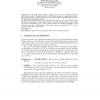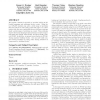457 search results - page 4 / 92 » Hypercomputation: computing more than the Turing machine |
CORR
1999
Springer
15 years 27 days ago
1999
Springer
: In the early 1980s, Selman's seminal work on positive Turing reductions showed that positive Turing reduction to NP yields no greater computational power than NP itself. Thu...
90
Voted
IJBC
2007
15 years 1 months ago
2007
A Chaitin Omega number is the halting probability of a universal prefix-free Turing machine. Every Omega number is simultaneously computably enumerable (the limit of a computable...
110
click to vote
CJ
2006
15 years 1 months ago
2006
Abstract. Uncertainty is an inherent property of all living systems. Curiously enough, computational models inspired by biological systems do not take, in general, under considerat...
107
click to vote
IGPL
2006
15 years 1 months ago
2006
Since 1996, some models of recursive functions over the real numbers have been analyzed by several researchers. It could be expected that they exhibit a computational power much g...
101
click to vote
SIGCSE
2006
ACM
15 years 7 months ago
2006
ACM
We present a hands-on approach to problem solving in the formal languages and automata theory course. Using the tool JFLAP, students can solve a wide range of problems that are te...


